In this article:
Everybody wants to look phenomenal with a youthful appearance, and one way to do so is with bright eyes that sparkle! The eyes are deemed windows to the soul, so keeping them clear and sparkling is something many people want.
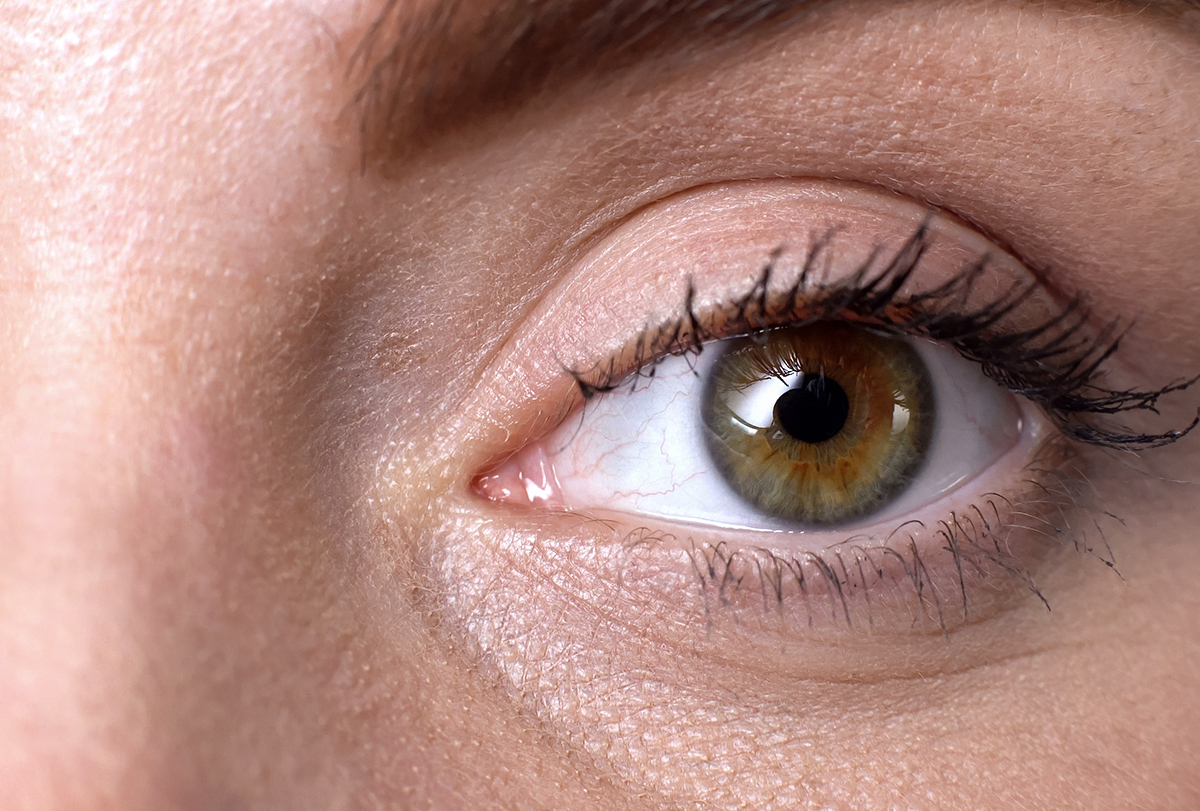
From magazines to TV Shows, a special focus on beautifying the eye is always made. This is because the eyes are a key part of one’s looks.
Usually, red and dry eyes due to any kind of eye irritation reduce the natural eye sparkle. This makes it extremely important to take good care of one’s eyes and keep them healthy and rejuvenated.
Moreover, keeping the area around and under the eyes healthy also becomes equally important because issues such as dark circles are also of concern as they might not look so good.
The good news is that there are simple ways of boosting your eye health as well as adding sparkle to your eyes.
How to Get Clear and Sparkling Eyes Naturally
Here are some ways to keep your eyes clear and bright.
1. Get good sleep
Getting sufficient sleep is crucial for rejuvenating your eyes and ensuring their optimal function the next day.
It’s recommended to aim for at least 7 hours of uninterrupted sleep every night to avoid eye strain, dryness, and twitching caused by prolonged wakefulness.
To promote good sleep hygiene, avoid using electronic devices such as phones and watching TV before going to bed as they can disrupt your sleep patterns and expose your eyes to harmful radiation.
If you frequently experience interrupted sleep, it may lead to tiredness, puffy eyes, and under-eye bags. (1)
2. Maintain proper hydration
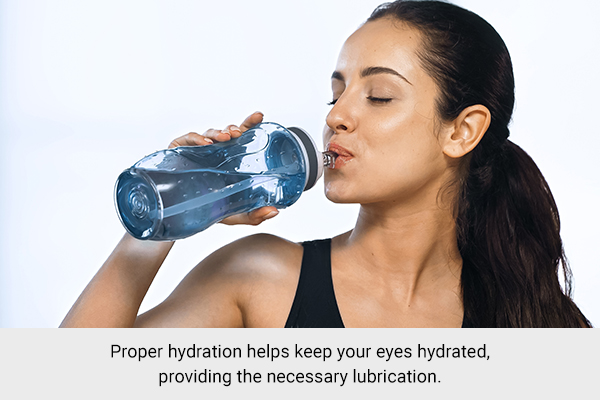
Maintaining adequate hydration is a crucial aspect of leading a healthy lifestyle. It not only positively impacts your overall health, but it is also critical for promoting healthy eyes.
Consuming a minimum of 8 ounces of water daily is essential to ensure your body receives sufficient fluids and moisture. Proper hydration helps keep your eyes hydrated, providing the necessary lubrication. (2)
Try these expert tips to remain hydrated:
- Carry a reusable water bottle with you throughout the day, so you always have access to water.
- Set reminders on your phone to drink water at regular intervals.
- Choose water over sugary or caffeinated drinks.
- Try flavoring your water with fruit or herbs to make it more enticing.
- Keep track of your water intake with a journal or app to stay accountable and on track.
- Don’t wait until you’re thirsty to drink water; aim to drink water consistently throughout the day.
3. Perform eye massage
Sometimes, you may experience puffy eyes. Fortunately, there are simple massages that can help relieve tiredness in your eyes. You can use specific finger movements to get rid of dullness.
To start your eye massage, move your fingers from the inside to the outside of your eye (top of the eyelid) in a circular motion. It’s also beneficial to focus on the acupressure points and move your fingers in small circles around your eyes.
While massaging, avoid going back and forth and keep your fingers straight to prevent scratching or hurting yourself with your nails. Make sure to trim your nails to avoid this from happening. (3)
Massaging can improve lymph drainage and boost blood circulation, in turn reducing inflammation and the appearance of dark circles. (4)
4. Stay away from dry air
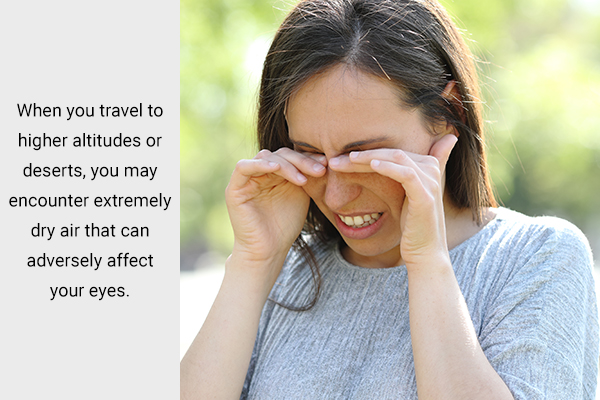
When you travel to higher altitudes or deserts, you may encounter extremely dry air that can adversely affect your eyes. This is because the lack of moisture in the air can cause the tears in your eyes to evaporate.
Additionally, in desert areas, warm and dry air can lead to more rapid moisture loss from the surface of your eyes than in cooler climates. Low humidity levels can also contribute to eye irritation and discomfort.
Other factors that can cause dry eyes include exposure to excessive wind, poor air quality, certain medications, and smoke inhalation. (5)(6)
5. Use cucumbers
For ages, people have used cucumbers as a go-to eye care method. Applying cucumber slices under the eyes can reduce puffiness and manage dark circles. Cucumbers are also known for their soothing effects when applied to the eyes.
To achieve clear and bright eyes, it’s essential to reduce water retention and swelling around the eyes. Cucumbers contain powerful substances with antioxidant and anti-inflammatory properties, as well as vitamin C, which can help rejuvenate tired eyes. (7)(8)
To freshen up with sparkling eyes:
- Wash and dry a fresh cucumber.
- Cut the cucumber into thin slices.
- Lie down and place a slice of cucumber on each closed eyelid.
- Leave the slices on for 10–15 minutes.
- Remove the slices and rinse your face with cool water.
- Pat your face dry with a soft towel.
6. Apply rose water
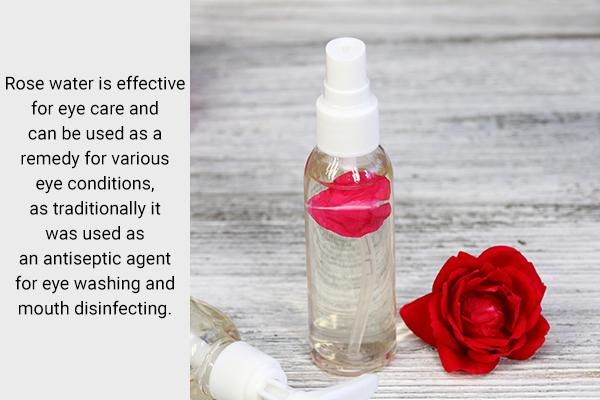
Rose water is a popular ingredient in the skin care industry due to its anti-inflammatory properties. It is also effective for eye care and can be used as a remedy for various eye conditions, as traditionally it was used as an antiseptic agent for eye washing and mouth disinfecting.
If you suffer from eye dryness or infection, you can apply rose water to the affected areas using a dropper. Putting a drop or two of rose water on the affected eye can be beneficial and can help to reduce inflammation. (9)(10)
You may also use cotton pads to apply rose water to your eye area. To do so:
- Wash your face with a gentle cleanser and pat it dry with a towel.
- Soak two cotton pads in rose water, making sure they are fully saturated.
- Lie down and place one cotton pad on each closed eye, making sure it is covering the entire eye area.
- Leave the cotton pads on for 10–15 minutes to allow the rose water to soothe and refresh your eyes.
- After 15 minutes, remove the cotton pads and discard them.
- Gently rinse your face with cool water and pat it dry with a soft towel.
7. Make use of green tea bags
Tea bags offer numerous benefits when used as an eye compress. Research shows that green tea, in particular, can provide a safe and effective treatment for dry eyes. Tea bags are also the ideal size for mild to moderate dry eyes.
The benefits of using tea bags on your eyes include reducing dark circles by constricting blood vessels when applied cool. They can also decrease puffiness and swelling around the eyes, improve eye inflammation, and reduce redness due to eye irritation.
Green tea contains powerful chemicals with anti-inflammatory and antioxidant properties that can benefit your eyes. (11)
To use green tea bags for your eyes:
- Steep 2 green tea bags in hot water for a few minutes.
- Take the tea bags out and let them cool down for a few minutes.
- Lie down and place one tea bag on each closed eye.
- Leave the tea bags on for 10–15 minutes.
- Remove the tea bags and gently rinse your eyes with cool water.
- Pat your eye area dry with a soft towel.
8. Wear sun protection
To prevent dry eyes caused by the sun, it is important to protect yourself from sunlight and its harmful rays. The skin under your eyes is sensitive and can be damaged by excessive sun exposure, leading to sunburn on the eyelids.
To avoid this, wear sunglasses with UV protection when you go out in direct sunlight. These sunglasses not only will shield your eyes from the sun’s rays but also will protect them from harsh environmental factors such as dry air and wind. (12)(13)
Several experts recommend these measures to protect your eyes from the sun:
- Wear UV-protective sunglasses when going out in the sun.
- Use a wide-brimmed hat or cap to provide shade for your face and eyes.
- Avoid going out in the sun during peak hours when the sun’s rays are the strongest.
- Take regular breaks if you have to spend a lot of time in the sun, and rest your eyes in the shade.
9. Give your eyes a break
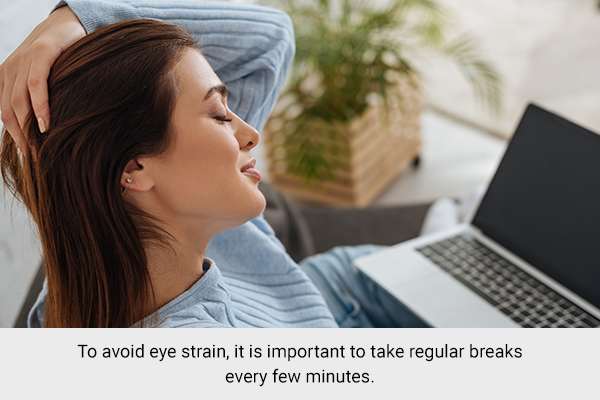
Consistent use of electronic devices, as well as doing activities such as reading, writing, and studying, can lead to tired eyes due to prolonged concentration and visual focus. To avoid eye strain, it is important to take regular breaks every few minutes.
Extended screen time can also cause dryness and irritation in the eyes, which can be alleviated by blinking frequently to ensure an even distribution of moisture. (14)
10. Implement dietary interventions
The given dietary interventions can help promote sparkling eyes.
Consume omega fatty acids
Researchers found that taking omega-3 fatty acid supplements can reduce the incidence of dry eyes by improving the eye’s oil film. Omega-3 and omega-6 fatty acid supplements are both effective in treating dry eyes and maintaining eye health and hydration.
You can also increase your intake of foods rich in these fatty acids, such as walnuts, salmon, flaxseeds, kale, Brussels sprouts, beans, tuna, and spinach. (15)(16)
Note: Do not take omega fatty acids or any nutritional supplements without consulting a doctor first.
Say no to salty foods
Research has shown that excessive consumption of salt in the diet can lead to swollen and lackluster eyes. Salt causes water retention around the eyes, resulting in increased puffiness. Inflammation can also occur, leading to redness and irritation in the eyes.
To avoid this, reduce your salt intake and avoid foods that are high in sodium. (17)
11. Seek medicinal interventions
Artificial tears
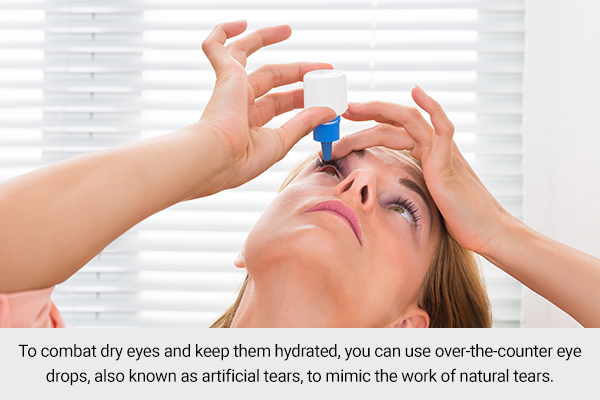
As you grow older, your eyes may become drier, leading to discomfort and irritation, while allergies can cause occasional eye itchiness.
To combat dry eyes and keep them hydrated, you can use over-the-counter eye drops, also known as artificial tears, to mimic the work of natural tears. (18)
To properly use artificial tears:
- Wash your hands thoroughly with soap and water before handling the eye drops.
- Gently tilt your head back while sitting or lying down.
- Pull down your lower eyelid to create a small pocket.
- Hold the eyedropper close to your eye and carefully squeeze 1–2 drops into the pocket created by your lower eyelid. Be careful not to touch your eye with the dropper.
- Release your eyelid and close your eyes gently.
- Press lightly on the inner corner of your eye near your nose with your finger. This can help prevent the drops from draining into your tear duct and being absorbed into your bloodstream.
- Keep your eyes closed for 1–2 minutes to allow the drops to spread over your eye.
- Repeat for the other eye if necessary.
Who Needs to Do Extra Care for Their Eyes?
Experts say that everybody should care for their eyes, extra care of the eyes is crucial for some individuals, such as people wearing glasses, those who had recent eye surgery or injury, and those with risk factors for vascular or hematologic diseases. It’s also important to consider a family history of migraine headaches.
Experts add that yearly eye checkups are recommended, especially with the increasing use of gadgets and rising cases of diabetes and hypertension. Acute loss of vision is a serious sign and requires urgent attention from an ophthalmologist.
Keratomalacia is a condition caused by vitamin A deficiency often seen in patients with protein-calorie undernutrition. Experts explain how it results in a dry and hazy cornea, corneal ulceration, and secondary infections due to extreme dryness caused by a lack of tears that affects the lacrimal glands and conjunctiva.
Existing Burden of Eye Issues
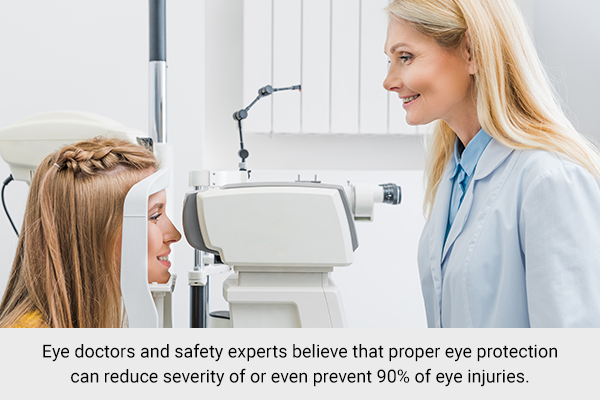
According to the National Institute for Occupational Safety and Health (NIOSH), around 2,000 American workers experience work-related eye injuries that need medical attention every day.
Eye doctors and safety experts believe that proper eye protection can reduce the severity or even prevent 90% of such eye injuries.
Moreover, around 93 million American adults are at high risk for severe vision loss, but only half of them had an eye exam within the last 12 months.
It is projected that the economic burden of major vision problems will rise to $373 billion by 2050. (19)
When to See a Doctor
If you are experiencing persistent symptoms of dry eyes, such as discomfort, burning, itching, redness, blurred vision, or sensitivity to light, it is recommended to see a doctor.
You should also seek medical attention if you are experiencing severe symptoms that are affecting your daily activities or if you have tried over-the-counter treatments without relief.
Additionally, if you have a history of eye problems or conditions or if you are taking medications that may cause dry eyes, consult your doctor for proper evaluation and treatment.
Most-Asked Questions About Eye Health
What are the symptoms of dry eyes?
As shared by experts and ophthalmologists, dry eye symptoms include:
- Stinging eyes
- Burning sensation in the eyes
- Excessive need to scratch
- Eye irritation
- Tearing up continuously
- Redness in the eyes
- Discomfort
- Feeling like there’s a foreign body stuck in the eye
- Blurred vision
- Eye pain
- Flood of tears after severe irritation
What are the factors that can worsen dry eye problems?
Experts say that symptoms of dry eyes can be exacerbated by certain factors, including:
- Dry, windy, dusty, or smoky local environments (5)(6)
- Extended periods of visual activity, such as reading, working on the computer, driving, or watching television (14)
Conversely, symptoms may improve on cool, rainy, or foggy days or in high-humidity environments such as the shower.
What are the types of dry eye disorders?
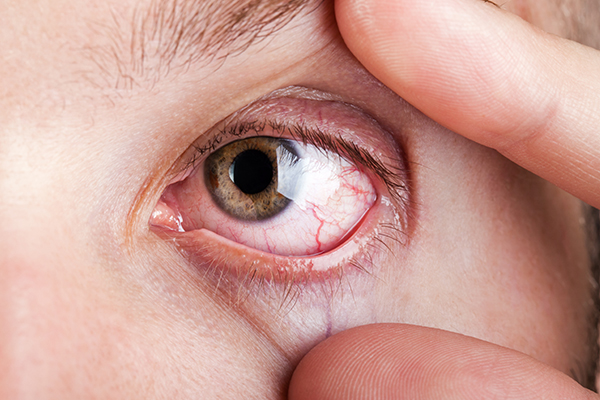
Keratitis sicca, commonly referred to as dry eyes, has two distinct types. The first is aqueous tear-deficient keratoconjunctivitis sicca, which results from insufficient tear production.
The second and more prevalent type is evaporative keratoconjunctivitis sicca, where poor tear quality leads to rapid tear evaporation. (20)
What are some dietary ingredients that can promote eye health?
Here are some commonly found ingredients that are good for your eyes:
- Cucumbers
- Vitamin-C rich foods
- Tomatoes
- Green tea
- Milk
- Potatoes
Final Word
Clear and sparkly eyes are important to look healthy and confident. Irritated eyes can disrupt your quality of life, and puffy eyes don’t do much for you as well.
Trying out the remedies mentioned above can boost your eye health and give you a more natural sparkling look.
- Was this article helpful?
- YES, THANKS!NOT REALLY


